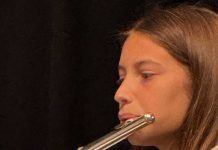A crowd of eight squirmy pre-schoolers gathers, enraptured, at
the knees of Carlos Banuelos. The 18-year-old Gavilan College
student has just begun to read aloud from the well-known children’s
book
”
The Very Hungry Caterpillar.
”
A crowd of eight squirmy pre-schoolers gathers, enraptured, at the knees of Carlos Banuelos. The 18-year-old Gavilan College student has just begun to read aloud from the well-known children’s book “The Very Hungry Caterpillar.”
As Banuelos reads, the kids close in on him, pointing to the colorful drawings on the page and helping him count the pieces of fruit consumed by the hungry bug.
This is Banuelos’ fourth visit of the semester to Gavilan’s Child Development Center, as part of a new “First year experience” program designed to retain and help under-achieving students integrate to college life.
By reading to and observing the youngsters, the 55 new community college students not only discover how positive the
experience can be for young minds, they discover insights into their own history – and, often, struggles – with reading.
“This is trying to help them and it’s trying to help us,” said Matt Vieira, 19, another student in the program.
The students, mostly in their first semester at Gavilan, are not child development students. They are enrolled in an English course and a reading course that are the lowest level offered at the college, or two levels below regular freshmen courses.
“They’ve all had kind of low success in their own English experience, so we thought, ‘How do we turn that around and get them excited about reading and learning through reading?’ ” said Karen Warren, English instructor.
For many, like Johanna Garcia, 23, English is their second language.
“I never was read to,” she said. “(My parents) didn’t even know how to read their own language, so we never had anybody read to us.
“My story’s similar,” said Juana Salgado, 21, who coincidentally plans to major in child development. She struggled in school, mostly with reading. “It was really because a lot of the words were new to me.”
Throughout this semester, the students visit the Child Development Center with books they have chosen and take turns reading and observing the children.
“We’re trying to see what interests them when we’re reading to them,” Vieira said. “We’re mostly doing the observations of how they learn and behave when they’re watching us.
“If they’re interested, they’re going to want to read.”
Besides studying the importance of reading, the students are getting their first taste of a college-level research project that relates to reading and learning. Some are studying the efficacy of bilingual education, or how learning disabilities affect children’s literacy skills.
Vieira’s research is going more in-depth than students’ classroom observations, to see what about reading most captivates children and how reading can be made more enjoyable.
“If we relate something we’re reading to them, they have fun,” Vieira said. “I think we could help them learn better that way.”
The way the children smile, listen intently, and vie for the Gavilan students’ attention during their fourth visit this week, it’s clear they are enjoying themselves.
“Now they’re getting used to it,” said Gilda Figueroa, a teacher at the Child Development Center. “Now they’re familiar with them and they can sit and ask questions and feel comfortable with them. They can really get into the story.”
Garcia is researching the similarities between the way young children and adults learn.
“I discovered how similar kids learn to how we learn,” she said. “The more they read, the better their vocabulary; the more we read, the more our skills improve.”
She and Salgado say their experience in the program will even impact their own parenting. Garcia said she never read to her son – who has a language delay – because she didn’t know how important it was. Now, she reads to him often and is amazed at the difference. His vocabulary is expanding, and when out and about he’ll often point out things he’s only seen in books.
“I was surprised by this research and how I can apply it,” Garcia said.
Social/cultural development and a counseling aspect round out the “First year experience” program that is a part of Gavilan’s learning communities, which match students in more than one course. The students will take a field trip to a college campus or nearby museum or artistic performance. Also, campus counselors teach the skills needed to be a successful college student, including study skills and time management.
Warren said the college plans to offer a second semester of the program in the spring, with the next level English and reading courses and a service learning project taking place in either a middle or high school.









